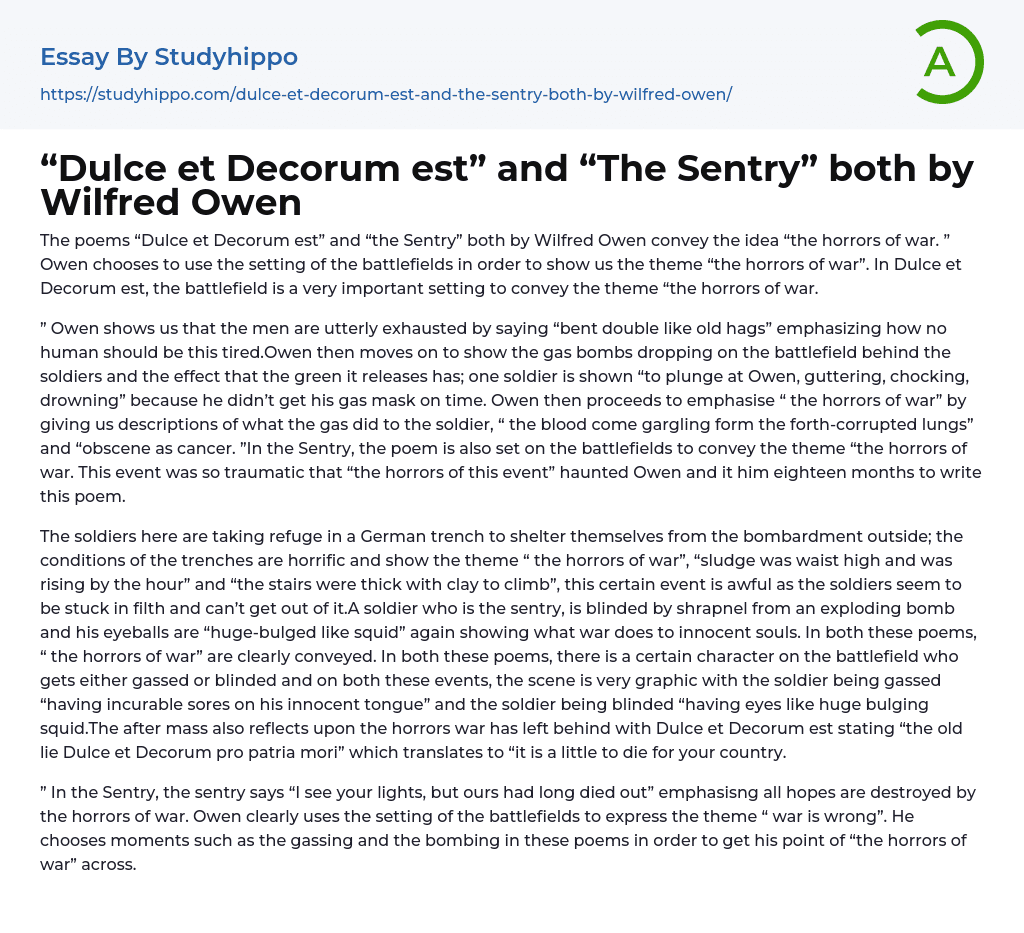

“Dulce et Decorum est” and “The Sentry” both by Wilfred Owen Essay Example
The themes of "the horrors of war" are effectively conveyed in both "Dulce et Decorum est" and "The Sentry," two poems by Wilfred Owen. Owen strategically employs the setting of the battlefield to reveal this theme, particularly in "Dulce et Decorum est."
Owen effectively portrays the overwhelming exhaustion of soldiers, stating they are "bent double like old hags", emphasizes that such extreme fatigue is inhumane. He then depicts the impact of gas bombs being dropped on the battlefield; demonstrating the soldier's inability to put on his gas mask in time, by showing one "plunging at Owen, guttering, chocking, drowning." Furthermore, Owen stresses "the horrors of war" by providing graphic descriptions of the effects of the gas attack, such as "the blood come gargling form the forth-corrupted lungs" and "obscene as cancer." I
...n The Sentry, which is also set on a battlefield, Owen continues this theme of "the horrors of war." The traumatic event depicted in the poem haunted Owen for eighteen months until he could write it.
The soldiers are seeking shelter in a German trench to protect themselves from the ongoing bombardment. The condition of the trenches illustrates the theme of "the horrors of war" with sludge rising waist-high and stairs covered in thick clay. The soldiers are trapped in filth, unable to escape. One sentry is blinded by shrapnel from an exploding bomb, resulting in his eyeballs bulging like squid. Both poems convey the dreadful reality of war, where innocent souls are afflicted by gas or blinded, as seen in graphic scenes. In Dulce et Decorum est, the aftermath speaks of the horrors of war left behind, saying "the old lie Dulce e
Decorum pro patria mori," which means "it is sweet and proper to die for your country."
"The Sentry" exemplifies the destruction of all hope through the perils of war as the sentry confesses, "I see your lights, but ours had long died out." Owen effectively conveys his anti-war message through the battlefields he portrays in his poetry. He specifically uses scenes of gassing and bombing to emphasize the theme of "the horrors of war."
- Book Summary essays
- Metaphor essays
- Reader essays
- Rhyme essays
- Literary devices essays
- Villain essays
- Books essays
- Genre essays
- Literary Criticism essays
- Writer essays
- Protagonist essays
- Simile essays
- Poem essays
- Book Report essays
- Book Review essays
- Greek Mythology essays
- Plot essays
- Tragic Hero essays
- Coming of Age essays
- Play essays
- Rhetoric essays
- Rhetorical Question essays
- Translation essays
- Understanding essays
- Reason essays
- Character essays
- Letter essays
- American Literature essays
- Literature Review essays
- Utopia essays
- Poetry Analysis essays
- Dante's Inferno essays
- Between The World and Me essays
- Incidents in The Life of a Slave Girl essays
- Flowers for Algernon essays
- Myth essays
- Everyday Use essays
- Boo Radley essays
- Genesis essays
- Richard iii essays
- Alice in Wonderland essays
- On the road essays
- Ozymandias essays
- The Nightingale essays
- Holden Caulfield essays
- Animal Farm essays
- 1984 essays
- A Hanging essays
- Shooting An Elephant essays
- A Tale Of Two Cities essays



